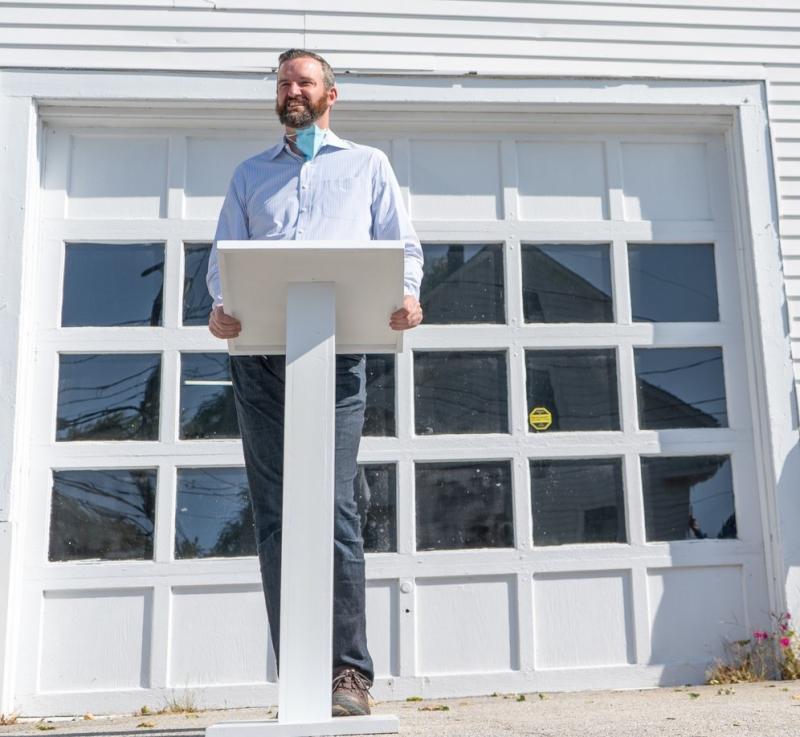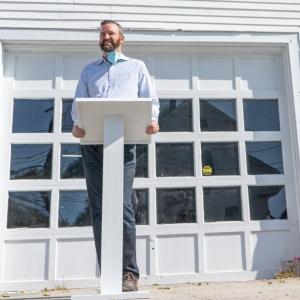Michael Mullins establishes Maine Museum of Industry in Rockland
ROCKLAND — Rockland resident Michael Mullins announced earlier this week his purchase of 25 Rankin Street, once home to Miller’s Garage. There, he plans to establish the Maine Museum of Industry, which will feature exhibits on major interests that have shaped Maine’s towns, cities, and rural landscape.
The 10,000 square foot building was acquired Sept. 17 from Edward B. Miller of Rockland for $165,000, per a news release. The building, according to the release, was originally a car dealership and was built between 1922 and 1944, according to public records. Recently, the property was leased to the Rockland Antiques Marketplace. The building has been vacant since August, after the marketplace closed.
The selection of 25 Rankin follows one year of research and consideration of multiple locations for the new museum, Mullins said.
Located in Rockland’s downtown district, the property is a special opportunity, Mullins said in an interview, since the building is a 1920s industrial building — namely, a “very early” car dealership.
“It's a perfect place for an industrial history museum because the building itself is an exhibit,” said Mullins.
A welcome center is to be constructed in 2020 to be followed by professionally designed exhibits, per the release.
The exhibits will carry the visitor from the very first industries of Maine to those of the present, in chronological order of appearance, beginning with trading and manufactures of Native American peoples; trapping and commercial fishing by European Settlers; cobblestones and granite; the timber industry, farming (hay, blueberries, and staples), and later on shipbuilding and ocean transportation, ground transportation, the lime industry, the ice industry, and textiles; all the way up to the paper industry, tourism, artwork, and modern industries like aquaculture (e.g. oysters, salmon, and seaweed), and renewable energy.
The Museum’s exhibits will be built out over a period of five years in collaboration with Maine-based companies and in partnership with local historic societies and private museums. A key feature of the museum will be a room on the lime industry, with artifacts from the Rockland & Rockport Lime Company donated by David Hoch, former president of R&R as it is known.
“I’m passionate about history and historic preservation, and this is a very exciting moment,” said Mullins. “There aren’t many surviving industrial buildings made of wood from the 1920s or earlier, and to be able to house a museum of industry in such a building is a special opportunity.”
Maine’s state historic tax credit program is one of the most progressive in the country, according to the news release, and is a wonderful resource to preserve buildings like Miller’s Garage.
“The 25 Rankin Street building is in a state of modest disrepair and has a history of environmental contamination including two prior DEP actions,” noted the release. “Mr. Mullins has a background in Historic Preservation, and intends to apply to have the building added to the National Register of Historic Places, and then conduct a complete historic rehabilitation to National Park Service Standards, utilizing both the Federal Historic Tax Credit and the Maine Historic Tax Credit.
“ Together, these two sources can provide funding for up to 45% of qualifying rehabilitation costs. The renovation, including time for architectural study and applications for federal and state funding is expected to take two years. In the meantime, the building will be kept in operation and be leased to multiple tenants, including the museum’s welcome center. The renovations are expected to cost between $500,000 and $750,000 and will include cleanup of any environmental conditions.”
Mullins brings experience to restoring land as he purchased and restored the former Crockett’s Quarry across Maverick Street from the Rockland Golf Club in 2015, and is on the board of directors of Mullins Management, a Boston based developer engaged in mixed income housing and historic preservation.
The concept to establish the museum is personal, and familial, for Mullins.
“My grandfather was a hunting and fishing guide, and also a mason,” he said. “My great grandfather ran a timber camp in the north woods, where my grandmother Evelyn Soucy worked as a clerk. This is very much a personal mission to preserve the story of Maine’s industrial history that my family has played a part in. People sometimes think of industry as something that happens ‘somewhere else’ in a factory. However, the landscape of Maine, from the islands to the quarries, and from the logging camps to the paper mills was very much shaped by the generations of industries, and will be shaped further by new industries to come. It is my hope that this museum will provide an interesting learning opportunity for children and adults alike to understand how Maine’s past has shaped present and future.”
Familial ties aside, Mullins is passionate about showcasing Maine’s history as a state through industry.
“I'm very interested in history, and also economics,” he said. “There is a direct link between the industries, and their economics, and the way Maine looks and feels today. Many of the islands on the mid coast were used for commercial fishing, or the production of granite. Mill towns grew up around paper mills. And so forth. It's impossible to understand Maine's history without understanding these industries, and the people who came to work in them.”
As his vision comes to fruition over the forthcoming years, Mullins is inspired by the various avenues he intends to use to share Maine’s history through exhibits.
One of those avenues will be also be sharing the fruits of his exhibits with area educators through a trio of primary areas of study including geography (how Maine’s towns and villages were shaped by industry), economics (Maine’s past and future major industries, and the importance of purchasing products from Maine), and anthropology (examining Maine’s early settlers and how they shaped the Maine we know today).
“I’m most excited about outreach to all the companies, historic societies, and museums around the state about their knowledge and materials about Maine's history,” he said. “There is an enormous opportunity to study and see the state. I look forward to doing that and working with a board on building the exhibits.”
Event Date
Address
United States
























